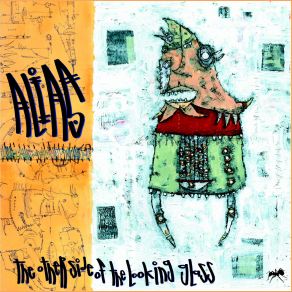The Other Side of the Looking Glass
Download links and information about The Other Side of the Looking Glass by Alias. This album was released in 2002 and it belongs to Electronica, Hip Hop/R&B, Rap, Alternative, Classical genres. It contains 13 tracks with total duration of 59:55 minutes.

|
|
|---|---|
| Artist: | Alias |
| Release date: | 2002 |
| Genre: | Electronica, Hip Hop/R&B, Rap, Alternative, Classical |
| Tracks: | 13 |
| Duration: | 59:55 |
| Buy it NOW at: | |
| Buy on iTunes $9.99 | |
| Buy on Amazon $8.99 | |
| Buy on iTunes $9.99 | |
Tracks
[Edit]| No. | Title | Length |
|---|---|---|
| 1. | Begin | 3:03 |
| 2. | Jovial Costume | 5:07 |
| 3. | Angel of Solitude | 3:47 |
| 4. | Dying to Stay | 5:10 |
| 5. | Getting By (Version 2) | 4:45 |
| 6. | Arrival | 4:17 |
| 7. | Watching Water | 4:05 |
| 8. | Opus Ashamed (Featuring Dose) | 4:57 |
| 9. | Black Tea | 5:37 |
| 10. | Inspirations Passing | 5:50 |
| 11. | Pill Hiding | 3:47 |
| 12. | Slow Motion People | 4:56 |
| 13. | Final Act | 4:34 |
Details
[Edit]By 2002, the Anticon crew had already been actively brushing up against hip-hop boundaries and questioning the genre's motives and aims for several years, the reason some in the rap community took a contentious view of the off-center collective. The music of The Other Side of the Looking Glass, however, is the very definition of barrier-exploding. There is a jittery, kinetic, midnight vitality to both the sound and sentiment expressed on this solo debut, yet Alias has an almost disarmingly serene way of wading through the mazes of his mind. "Opus Ashamed" with labelmate Doseone, "Jovial Costume," and "Pill Hiding" are authentic — and awesome, startlingly so — drum'n'bass, much closer to Roni Size & Reprazent's groundbreaking electronica than anything that has come out of the rap underground, let alone the mainstream. But then, aside from a handful of artists (OutKast, for instance), Alias proves himself more willing than most MCs or producers to take blind leaps forward, both musically and lyrically, stylistically and intellectually. Rather than "traditional" rap tunes, some of these songs play like knotted post-doctoral philosophical treatises set to airy and agitated musical scores — tracks like "Angel of Solitude," "Dying to Stay," the exceptional "Getting By (Version 2)," "Inspirations Passing" — piercing psychological expositions that go well beyond any conceivable definition of the conventional. If that sounds like too heady an objective for what, in its fundamentals, is pop music, maybe it is. But The Other Side of the Looking Glass without question grows hip-hop outward in almost every way, and does so such that the music is as fascinating as it is challenging and difficult. Alias discovered the rabbit hole, and this masterpiece reports back its deepest recesses in meaningful ways.